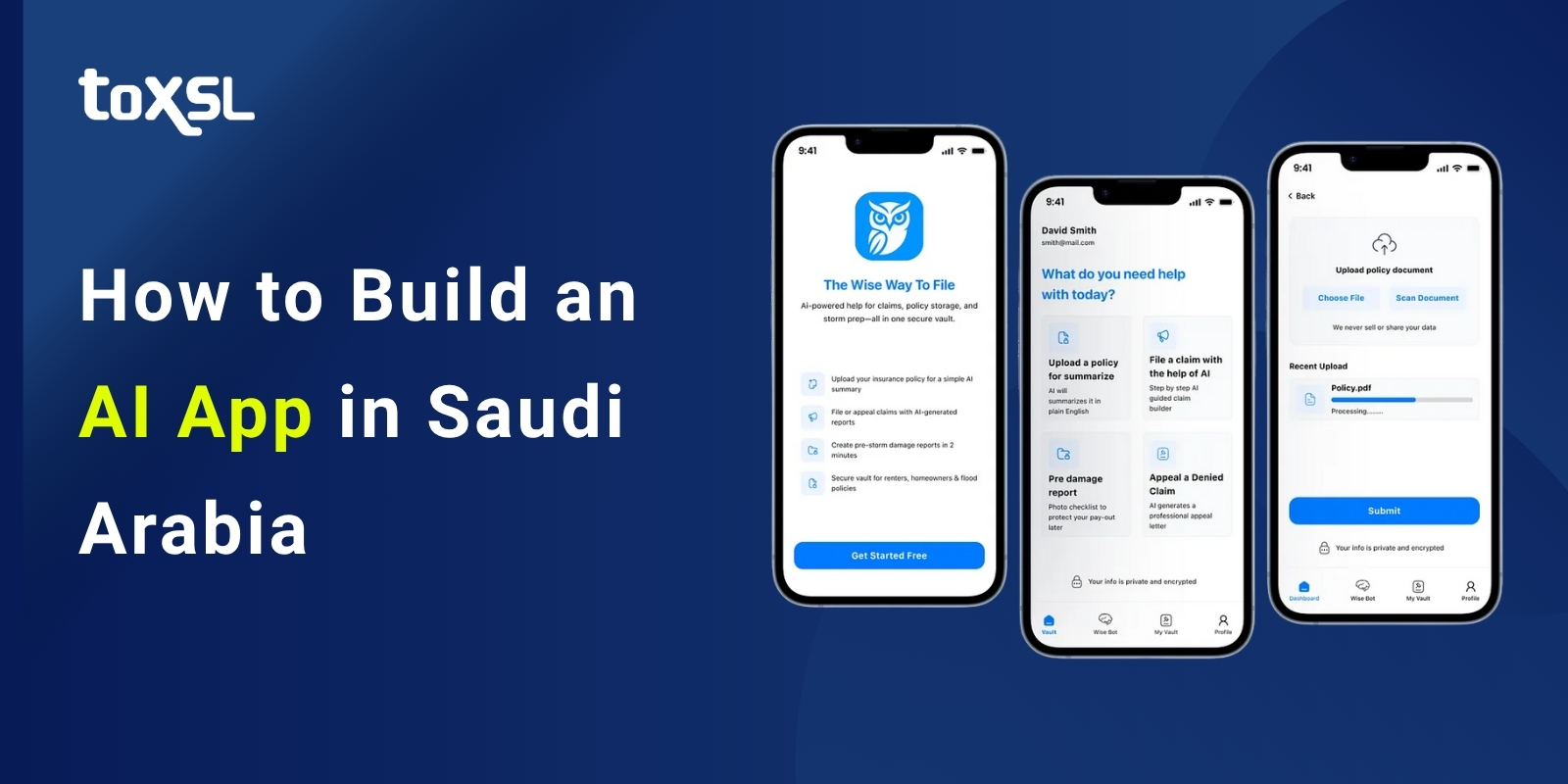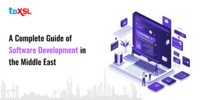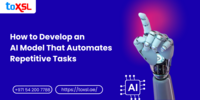- Oct 16, 2025
Share this post on:

The advent of AI has transformed how businesses work across the globe, and Saudi Arabia is no exception. With the growth in the AI market, the Saudi Arabian government is backing Vision 2030 and promising a great environment for AI app development. This, in turn, is helping the Saudi Arabian market expand globally, driven by government investments targeting AI technology advancement and infrastructure development, and capacity building.
Developing an AI app in Saudi Arabia is a strategic opportunity for businesses to expand. Whether you are aiming to solve business challenges and innovate healthcare, fintech, or education, developing an AI app in Saudi Arabia requires an understanding of technical and local contextual factors.
Key Takeaways
Saudi Arabia is making huge investments in AI and digital infrastructure, including projects worth billions of dollars.
AI is transforming key Saudi sectors such as healthcare, smart city development, finance, and manufacturing.
Building AI apps in Saudi Arabia requires compliance with evolving regulations on data privacy, AI ethics, and cybersecurity.
Saudi Arabia is strongly focused on ethical AI development, hands-on learning, real-world problem solving, and continuous upskilling through bootcamps.
Industry-integrated AI and data science diplomas launched recently in Saudi Arabia combine academic training with practical projects.
Key Statistics and Vision 2030 Trends
Vision 2030 is helping AI apps across various strategic sectors, including healthcare, smart cities, public services and e-governance, energy, fintech, education, eCommerce, and localization. Also, Vision 2030 has made big changes in Saudi Arabia, and more changes are planned in the next five years before 2030:
Rapid economic diversification: The government of Saudi Arabia is focusing more on industries, including technology, tourism, clean energy, and education.
Major investments in infrastructure: Projects such as the NEOM smart city, Riyadh Metro, and Red Sea Project are reshaping urban development.
Social transformation: Saudi Arabia has huge opportunities for youth and women, enhanced entertainment options, and relaxed social restrictions.
Government efficiency: The Saudi Arabian government is focused on transparency, accountability, and effective policy implementation that drives better public service.
Local businesses: There is strong support for SMEs and green energy adoption to foster innovation and lower carbon emissions.
Global positioning: The kingdom has maintained its spot in the top 20 of the world competitiveness ranking and is looking for new international partnerships.
| Metric | Value |
|---|---|
| Expected Saudi Arabia AI Market Size (2025-2033) | USD 120,128.1 million |
| Expected Annual Growth Rate (2025-2033) | 31.7% CAGR |
| Government Investment in AI (2024-2030) | USD 100 Billion |
| Key AI Authority | Saudi Data and Artificial Intelligence Authority (SDAIA) |
Government Initiatives Supporting AI in Saudi Arabia
Saudi Arabia has made AI a strategic priority under Vision 2030, introducing several government-led initiatives to accelerate AI adoption and innovation:
Saudi Data and AI Authority (SDAIA): SDAIA is the cornerstone of Saudi Arabia’s AI strategy, responsible for driving AI research, governance, and innovation across both public and private sectors. Its programs aim to transform the Kingdom into a global hub for AI, supporting projects in healthcare, finance, education, and smart cities. SDAIA also monitors compliance with ethical AI standards and data privacy regulations.
National Strategy for Data & AI (NSDAI): Launched to accelerate the adoption of AI across multiple sectors, NSDAI focuses on creating data-driven policies, improving AI literacy, and fostering a robust AI ecosystem. The strategy emphasizes AI-powered solutions for economic diversification, efficiency in public services, and sustainable development.
Smart Cities & NEOM: NEOM, the futuristic smart city, integrates AI into mobility, energy management, healthcare, and urban planning. From autonomous transportation to predictive energy grids and AI-assisted healthcare diagnostics, smart cities serve as a testbed for large-scale AI applications in real-world scenarios.
AI Research & Innovation Hubs: The Saudi government is establishing AI innovation hubs, incubators, and research centers to support startups, scale local AI talent, and promote collaboration with global tech companies. These hubs are instrumental in accelerating AI commercialization and fostering entrepreneurial ventures.
Workforce Upskilling: Vision 2030 emphasizes human capital development, and the government offers extensive AI training programs for youth and women. Initiatives include university courses, bootcamps, certifications, and hands-on workshops in machine learning, data science, natural language processing, and generative AI. This ensures the Kingdom has a skilled workforce ready to support AI adoption across sectors.
Step-by-Step Guide to Building an AI App in Saudi Arabia
Are you looking to develop an AI app in Saudi Arabia? Are you finding it challenging to develop an AI app in Saudi Arabia? To make the process less challenging, we have discussed the important steps that businesses must follow to develop a successful AI app in Saudi Arabia:
Define the Problem: Start by defining the problem and identifying the AI app’s use case. Understand the Saudi market and address the needs of the market, whether automating customer service, delivering customized recommendations, improving diagnostic accuracy in healthcare, or enhancing security systems. Understand your target users’ behaviors, preferences, language dialects, and device usage patterns common in Saudi Arabia.
Market Research: Identify the gaps, popular features you want, and look for user feedback on competitors' products. Saudi Arabia is focusing on integrating AI in finance, healthcare, and government sectors. Integrating AI in apps can help you identify your app and add value via innovation customized to local needs, such as Arabic language processing.
Choose the Right AI Technology: Select the right AI approaches based on the problem, such as supervised learning, unsupervised learning, natural language processing (NLP), or computer vision. A few of the popular AI frameworks include Tensorflow, PyTorch, and Scikit-learn.
Data Preparation: Data quality defines half of the success of your app. Hence, ensure to collect relevant datasets and eliminate inconsistencies, missing values, or bias. For Arabic language apps, collect diverse dialects and script variants to train robust NLP models.
Train the AI Model: Using the prepared data, build and train the machine learning model. This stage includes selecting algorithms, tuning hyperparameters, and validating model accuracy. Local data patterns and user behavior insights can improve model relevance. Test against fairness metrics to minimize bias, especially important under Saudi Arabia’s growing emphasis on ethical AI use.
Design UI/UX: Having a seamless, user-friendly interface can help your app succeed. There are features that you can consider, including voice recognition or chatbots should support Arabic dialects. Saudi users expect intuitive navigation and personalization, especially in apps for e-commerce, social networking, or government services.
Integrate AI Features: Combine the AI model with app functionalities such as recommendations, image recognition, or automated customer support. Integration should be smooth, minimizing latency and ensuring real-time responsiveness where needed. Use local servers or hybrid infrastructures to optimize speed and comply with data regulations.
Testing the App: Before launch, it is necessary to conduct functional, performance, and security testing. Engage Saudi users for beta testing to gather feedback on usability and verify compliance with data protection, localization, and cybersecurity standards.
Launch, Monitor, and Get Feedback: After testing, release the app on popular platforms (App Store, Google Play, web) and monitor usage analytics, engagement, and user reviews from Saudi Arabia. With that, iterate on features and improve model accuracy with fresh data and user feedback. Also, maintain transparency about AI decision-making processes, a legal and ethical expectation in Saudi Arabia.
How to Choose the Best Custom AI Development Company in Saudi Arabia
Saudi Arabia’s ecosystem is fueled by Vision 2030 and government support. Businesses are investing in custom AI app development constantly. Choosing the right AI development partner is essential for navigating technical complexity and delivering innovative AI solutions customized for the Saudi market. Key factors to consider:
Expertise in AI Technologies: Look for companies with proven expertise in AI technologies such as machine learning, deep learning, natural language processing, generative AI, and computer vision. The best AI companies have skilled AI engineers and data scientists who have expertise in AI frameworks such as TensorFlow, PyTorch, NLP libraries, and build scalable AI models.
Cultural Alignment: Saudi Arabia’s AI development needs sensitivity to local language, culture, and regulatory frameworks. Companies with a base or strong presence in Saudi Arabia offer smoother communication, and local teams facilitate easier collaboration.
Track Record: Assess potential partners by reviewing case studies, client testimonials, and ROI from their previous AI projects. Trusted companies offer consistent delivery of AI apps that have passed rigorous testing, compliance, and meet clients' business goals. Prioritize companies with positive reviews from other Saudi enterprises or government entities.
End-to-End AI Development: Choose a company that offers complete AI development services, from ideation, data collection, and model training, to app development, integration, deployment, and ongoing updates. The provider should be well-versed in integrating AI seamlessly into existing software ecosystems, ensuring a smooth user experience, and maintaining AI model performance.
Advanced AI Techniques: Saudi Arabia’s AI market is dynamic, embracing technologies like generative AI, edge computing, and multi-agent systems. Top-tier AI development companies stay updated with the latest technologies and incorporate them to enhance app functionalities.
How Much Does It Cost to Develop an AI App in Saudi Arabia?
If you are a business looking to tap into the app development market in Saudi Arabia, you should consider the approximate costs of developing an AI app based on complexity:
Basic AI Apps: $5,000 to $10,000+ USD
Mid-Level Complexity AI Apps: $10,000 to $30,000+ USD
Advanced AI Apps: $30,000 to $50,000+ USD
Generative or AI-First Apps: $50,000+ USD
Key Factors Influencing AI App Development Cost
Complexity and Features: The AI model's sophistication, whether simple rule-based logic or advanced machine learning algorithms, directly affects development time, skill requirements, and computational resources, increasing overall costs.
Type of AI Application: Different AI functionalities (chatbots, computer vision, NLP, generative AI, predictive models) require varying expertise and infrastructure, affecting pricing.
Data Requirements: Collecting, cleaning, and labeling data are resource-intensive tasks, particularly for Arabic language applications or industry-specific datasets. Complex models need longer training and more computing power.
Tech Stack and Infrastructure: Using cloud-based AI platforms such as AWS, Azure, or Google Cloud offers scalability but comes with ongoing costs. Alternatively, leveraging open-source frameworks reduces licensing fees but may increase development time.
Localization and Cultural Adaptation: Supporting Arabic dialects, right-to-left text orientation, and culturally relevant UX design necessitate additional development and testing investment.
Regulatory Compliance: Adhering to Saudi data protection laws, ethical AI guidelines, and securing the app increases costs but is important for legal operation.
Development Team Location: Hiring experienced local developers familiar with Saudi regulations may cost more, but ensures compliance and relevance. Offshore hiring can reduce costs but requires effective management.
Sector-Wise AI Applications in Saudi Arabia
AI adoption under Vision 2030 is transforming multiple sectors, helping Saudi Arabia achieve its economic diversification and innovation goals:
Healthcare: AI applications include predictive diagnostics, telemedicine platforms, automated medical imaging analysis, and personalized treatment plans. Hospitals and clinics are using AI to enhance patient care, improve operational efficiency, and reduce costs.
Finance & Fintech: AI is deployed for fraud detection, credit scoring, personalized banking solutions, automated customer service, and risk management. Fintech startups are leveraging AI to streamline payments, offer smart investment advice, and enhance financial inclusion.
Energy & Sustainability: AI-powered solutions optimize energy consumption, manage renewable energy sources, and predict maintenance needs for infrastructure. This supports Saudi Arabia’s goals for clean energy adoption and sustainable resource management.
Tourism & Entertainment: AI enables personalized travel recommendations, automated customer service, and immersive entertainment experiences. It also supports virtual tourism and AI-driven analytics for improving visitor engagement in entertainment and leisure sectors.
Education: AI-driven learning platforms provide personalized curricula, adaptive testing, and skill development aligned with Saudization and labor market needs. AI is also being used for student performance analysis and enhancing teacher efficiency.
Smart Cities: Beyond NEOM, AI powers traffic management, urban planning, public safety, waste management, and infrastructure optimization in other urban centers. AI-driven analytics support decision-making for city governance and resource allocation.
Agriculture: AI-enabled smart farming solutions improve crop yields, monitor soil and climate conditions, optimize irrigation, and enhance supply chain efficiency. This ensures sustainable food production while supporting the Kingdom’s agricultural diversification initiatives.
Future Trends and Vision 2030 AI Roadmap
Saudi Arabia’s AI strategy under Vision 2030 is not only about current applications—it is also focused on future trends and a roadmap for continued growth.
Expected AI Adoption Trends
By 2025: Widespread adoption of AI in healthcare, fintech, smart cities, and e-governance. Increased AI-powered predictive analytics and automation in key sectors. Expansion of AI education programs and research initiatives.
By 2027: AI integration across energy management, tourism, education, and industrial automation. More startups leveraging AI for innovative solutions. Government regulations and ethical frameworks are fully operational and integrated into business practices.
By 2030: Saudi Arabia aims to be a global AI hub. AI adoption will reach nearly every strategic sector, including energy, healthcare, education, finance, tourism, agriculture, and smart infrastructure. AI will contribute significantly to GDP growth, employment, and international competitiveness.
Vision 2030 AI Alignment with Global Advancements
Saudi Arabia’s AI agenda is designed to align with global AI trends:
Promoting generative AI, deep learning, and multi-agent systems to solve real-world problems.
Fostering AI ethics, transparency, and responsible deployment in line with international standards.
Encouraging cross-border collaborations with tech giants, research institutions, and startups to stay at the forefront of global AI innovation.
Opportunities for Businesses
Businesses can align their AI strategies with Vision 2030 by:
Developing AI apps tailored to local culture, language, and market needs.
Leveraging government incentives, research grants, and innovation hubs for AI R&D.
Partnering with Saudi AI companies to navigate regulations and accelerate adoption.
Investing in workforce upskilling to ensure teams can manage AI solutions effectively.
Conclusion
With strong government support, building an AI app in Saudi Arabia comes with a lot of various opportunities to grow and focus on technology under Vision 2030. To grow business in the Saudi Arabian market, it is necessary to design the app with users in mind and take their language and cultural preferences into consideration. With careful planning and respect for Saudi Arabia’s unique context, building an AI app can be a rewarding way to contribute to the Kingdom’s digital future and innovation goals.
If you are looking to hire the best Artificial Intelligence App Development Company in Saudi Arabia, look no further than ToXSL Technologies. Being the best AI app development company, we have developed numerous apps for the clients in Saudi Arabia, helping them contribute to the Kingdom's digital future.
Frequently Asked Questions
1. How long does it take to build an AI app in Saudi Arabia?
The development time ranges from 3 to 9 months, depending on the complexity of features, data availability, and AI integration scale. Simple apps take less time, while advanced AI apps take longer development time.
2. What are the key regulations to consider when developing an AI app in Saudi Arabia?
Developers must comply with Saudi Arabia’s Personal Data Protection Law (PDPL), cybersecurity regulations, and guidelines from the Saudi Data and Artificial Intelligence Authority (SDAIA). Data localization, privacy, transparency, and ethical AI use are major compliance requirements.
3. How much does it cost to develop an AI app in Saudi Arabia?
AI app development costs range from $10,000 for simple apps to over $100,000 for complex apps. A few factors influencing cost include app complexity, AI technology, and data processing.
4. Can startups in Saudi Arabia afford to build AI apps?
Yes, startups can develop AI apps by focusing on minimum viable products, leveraging pre-trained AI models, and hiring local or offshore developers. With that, the Government of Saudi Arabia is supporting businesses under Vision 2030.
5. What local considerations are important for building an AI app in Saudi Arabia?
Localization is key. Supporting Arabic language and dialects, respecting cultural norms, using local data sources, and designing user-friendly interfaces for Saudi users improve adoption. Partnering with local AI experts helps ensure relevance and regulatory compliance.








